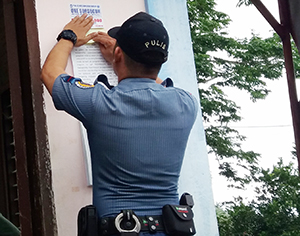Social Embeddedness and Police-Community Relations in the Philippines
Student Researchers: Matthew Nanes, Dotan Haim, and Michael Davidson
Location: Philippines
 How does the social embeddedness of a local police force influence service provision, local governance, and the rule of law? Close relationships between officers and those they police could increase corruption, or it could facilitate monitoring and enforcement of the law, resulting in greater rule and order. In short, how does the social embeddedness of a local police force influence service provision, local governance, and the rule of law? In the Philippines, where President Duterte's bloody war on drugs been waged in-part using the country's national police force, the answer to these questions are all the more important.
How does the social embeddedness of a local police force influence service provision, local governance, and the rule of law? Close relationships between officers and those they police could increase corruption, or it could facilitate monitoring and enforcement of the law, resulting in greater rule and order. In short, how does the social embeddedness of a local police force influence service provision, local governance, and the rule of law? In the Philippines, where President Duterte's bloody war on drugs been waged in-part using the country's national police force, the answer to these questions are all the more important.
Using a unique system of name inheritance in the Philippines, we map entire family networks for many local communities. Family networks play an important role in Filipino society, variously affecting work, social and political life. We locate local police within these networks and conduct an in-depth survey of local citizens on their interactions and feelings toward their local law enforcers, who are located at different social distances from respondents. In addition to respondent-police proximity, we explore the relationship that average police force embeddedness in local family networks plays.
The findings from this study will have wide-ranging implications for the understanding of effective local governance, which is widely recognized as being crucial to development efforts. Understanding the way in which bureaucratic embeddedness impacts local public goods provision can inform the more effective assignment of people charged with implementing large development programs.
When we correlate social distance between respondents and law enforcers, we find that when citizens are more closely related to an officer, they exhibit greater trust in that officer, are more likely to report a crime to him, and perceive him as fairer. Furthermore, citizens in villages where officers have closer family ties are more likely to report crimes. We suggest that these findings have important implications for improving state legitimacy in weak states. Increased linkages between street-level service providers and the citizens they serve simultaneously increases citizen buy-in with critical state institutions.

 How does the social embeddedness of a local police force influence service provision, local governance, and the rule of law? Close relationships between officers and those they police could increase corruption, or it could facilitate monitoring and enforcement of the law, resulting in greater rule and order. In short, how does the social embeddedness of a local police force influence service provision, local governance, and the rule of law? In the Philippines, where President Duterte's bloody war on drugs been waged in-part using the country's national police force, the answer to these questions are all the more important.
How does the social embeddedness of a local police force influence service provision, local governance, and the rule of law? Close relationships between officers and those they police could increase corruption, or it could facilitate monitoring and enforcement of the law, resulting in greater rule and order. In short, how does the social embeddedness of a local police force influence service provision, local governance, and the rule of law? In the Philippines, where President Duterte's bloody war on drugs been waged in-part using the country's national police force, the answer to these questions are all the more important.